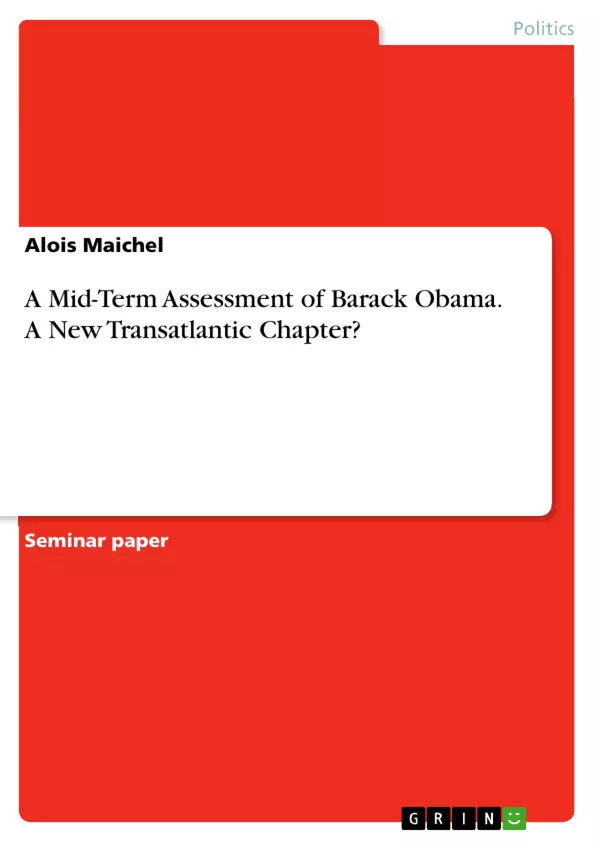The mid-term of a presidency in the United States (US) is a good time for a first assessment. In this paper, the focus is put on the state and outlook for the transatlantic relations between the US and the the EU member states.
In the second chapter, we will set the definitions and the dimensions of the transatlantic relations.
Chapter 3 comprises the thesis of this paper: the US-EU relation is an unbalanced relationship. There is a deeper relation in regard to defense and security than in other policy issues, and the relation is still based on intergovernmental coordination in forums like the NATO than between the US and the EU bodies.
The assessment of the thesis for the first two years of President Obama’s administration will be done in Chapter 4.
Chapter 5 gives an approach for a New Transatlantic Chapter by deepening the economic integration of the transatlantic area.
Inhaltsverzeichnis (Table of Contents)
- Introduction
- Definitions and Dimensions
- Thesis: The US-EU Relation is an Unbalanced Partnership
- During Presidential Campaign: European Expectations and Obama’s Promises
- First Year: Leading and Listening
- Second Year: Perception and Perspective
- Conclusion
- A New Transatlantic Chapter? - Approaches for a More Balanced Transatlantic Partnership
- Is it trade, stupid?
- Enough common sense for enhancing the partnership?
- How can forces be joined on the global agenda?
Zielsetzung und Themenschwerpunkte (Objectives and Key Themes)
This paper assesses the state and outlook of transatlantic relations between the US and the EU member states, particularly focusing on the first two years of President Obama’s administration. It examines the evolving nature of the relationship since the end of the Cold War, highlighting the shift from a shared goal of opposing communism to navigating the complexities of globalization and power dynamics. The paper argues that the US-EU partnership remains vital but is currently unbalanced, prioritizing defense and security over economic and political cooperation.
- The evolving nature of transatlantic relations since the end of the Cold War
- The US-EU partnership as an unbalanced relationship, prioritizing defense and security
- The role of President Obama's administration in shaping transatlantic relations
- The potential for a "New Transatlantic Chapter" through deeper economic integration
- The challenges and opportunities for the US and EU to work together on global issues
Zusammenfassung der Kapitel (Chapter Summaries)
The first chapter introduces the paper's focus on assessing the state and outlook of transatlantic relations during President Obama's first two years in office. Chapter two defines the term "transatlantic" in the context of US-EU relations, highlighting the economic and military dimensions of this partnership. Chapter three presents the thesis: the US-EU relationship is unbalanced, with a greater emphasis on defense and security through NATO compared to other policy areas. The chapter examines the historical context and argues that while the US-EU partnership is vital, it is characterized by an uneven power dynamic and competition for global influence.
Schlüsselwörter (Keywords)
The primary keywords and focus topics of this paper include transatlantic relations, US-EU partnership, NATO, defense and security, economic integration, globalization, power dynamics, and President Obama's foreign policy. The paper explores the complexities of the US-EU relationship, examining the historical evolution, current state, and potential future of this vital partnership. The paper also analyzes the role of President Obama's administration in shaping the transatlantic agenda and navigating the challenges of a changing global landscape.
Frequently Asked Questions
What is the main assessment of Obama's transatlantic policy?
The paper argues that the US-EU relationship during Obama's first two years remained an unbalanced partnership, prioritizing defense and security over other policy areas.
How is the term "transatlantic" defined in this context?
It refers to the multidimensional relations (military, economic, political) between the United States and the member states of the European Union.
Why is the US-EU relationship described as "unbalanced"?
Because coordination is still primarily based on intergovernmental forums like NATO (security) rather than balanced cooperation between the US and EU bodies on economic issues.
What were the European expectations of President Obama?
Europeans had high expectations for a more multilateral approach and a shift away from previous unilateral policies, often summarized as "Leading and Listening."
How can the transatlantic partnership be improved?
The paper suggests deepening economic integration and trade as a way to create a more balanced and robust "New Transatlantic Chapter."
- Citation du texte
- Alois Maichel (Auteur), 2011, A Mid-Term Assessment of Barack Obama. A New Transatlantic Chapter?, Munich, GRIN Verlag, https://www.grin.com/document/284409



